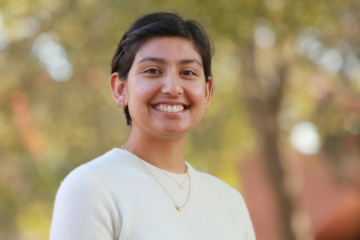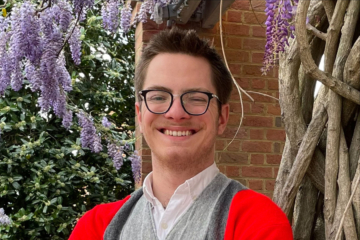Two William & Mary seniors spent this academic year leading a student team researching specific concerns faced by a subset of refugees displaced by war in Ukraine — LGBTQI community members.
Zoha Siddiqui ’23 and Aubrey Lay ’23 served as co-directors of The Exodus Project, which is one of the student-run research programs currently ongoing at W&M’s Global Research Institute. Exodus’ purpose is to create solutions to challenges faced by vulnerable groups during displacement crises.
“LGBTIQ+ people are often excluded from health research, programs and policy worldwide; we have already learned in interviews with activists that there is little, if any, programmatic support or policies that include LGBTIQ+ refugees,” said Reya Farber, assistant professor of sociology specializing in the intersection of globalization, health and gender. “At a time when LGBTIQ+ people are increasingly marginalized worldwide, the work of The Exodus Project will fill evidence gaps and offer practical policy solutions to address their needs.”
Siddiqui and Lay built on groundwork put in place when Jahnavi Prabhala ’22 founded The Exodus Project in 2019 by assembling global non-governmental organizations, United Nations stakeholders and a team of interdisciplinary scholars and students. Prabhala and Siddiqui as co-directors focused on menstrual hygiene management among Venezuelan migrant populations which, after presentation of Prabhala’s resulting white paper to UNICEF Colombia, resulted in extra funding for that specific need.

“The networking and all of the connections are from our own relationships with outside organizations,” said Siddiqui, a double major in international relations and transitional justice who will study in Ireland next year on a Mitchell Scholarship. “We’ve been able to see tangible change and get people who are in positions of power to do something to consider these issues who hadn’t before.
“Doing that as students at William & Mary, we’re doing pretty amazing work, and we’ve had a ton of support. What makes William & Mary — the Global Research Institute in particular — unique is having that undergraduate focus.”
Siddiqui and Lay will soon add to the white paper and 2022 and 2023 op-eds for “Ms.” magazine produced on the Venezuelan population with written pieces about their research about LGBTQI Ukrainian refugees. Both students are 1693 Scholars and have been able to use enrichment funding from the program for this work, which includes panels, presentations and advocacy.
They have used strategy, outlook and policy-relevant expertise gleaned from working with Amy Oakes, University Associate Professor for Teaching Excellence in government, on GRI’s Project on International Peace and Security. Oakes and Farber served as faculty advisors.
Student researchers from Russian and post-Soviet studies, international relations and public health backgrounds, as well as those who are of American, Russian or Ukrainian ancestry, have worked on the project.

“One of the questions we often get when we talk about this research is how big of an issue is this really?” said Lay, a double major in government and linguistics who will be a Fulbright scholar in Estonia after graduation.
“Maybe if we’re talking about LGBTQI refugees, this could potentially be a really small population. The problem and one of the major issues that we are trying to tackle and understand in our research right now is there is a severe lack of data on LGBTQI refugees, coming from Ukraine and just in general.”
The two main reasons for that, Lay added, are that it simply isn’t a priority for a lot of larger institutions that are provisioning aid. Secondly, the population is very vulnerable, and in many situations people are not comfortable revealing their sexuality, gender identity or intersex status to other people or institutions.
“In many situations, it isn’t safe for them to do so,” Lay said. “This is an issue we feel is really important to highlight because of all those unknowns.”
Unique health issues faced by displaced LGBTQI Ukrainians may include needs for psychosocial support, medical support, housing, particular needs relating to transgender, gender nonconforming and intersex refugees, and HIV/AIDS treatment.
“One major issue is that specifically those who are transgender, gender nonconforming or intersex in many cases have unique needs regarding psychosocial support and medical support that can include affirming mental health care, gender-affirming hormone treatment and other medical treatment,” Lay said.
“Doing that as students at William & Mary, we’re doing pretty amazing work, and we’ve had a ton of support. What makes William & Mary — the Global Research Institute in particular — unique is having that undergraduate focus.”
Zoha Siddiqui ’23
Along with the challenges all refugees face in accessing healthcare and a supportive community in a part of the world they’re not from or familiar with, LGBTQI populations also may face additional stigma and discrimination. Often, they are most helped by and comfortable with receiving care from other LGBTQI people, Lay said, and organizations in European countries welcoming migrants have stepped up to provide it.
“A huge problem that we’ve seen is a lack of housing in general for Ukrainian migrants, but especially safe housing leading to that sense of social community and also physical safety and access to particular resources that LGBTQI Ukrainian refugees would need,” Siddiqui said.
“There are all these concerns that go into humanitarian responses to any migrant crisis — housing, medication, sense of community, mental health support. And those needs are potentially even more acute for LGBTQI populations in very specific ways.”
Jennifer L. Williams, Communications Specialist

